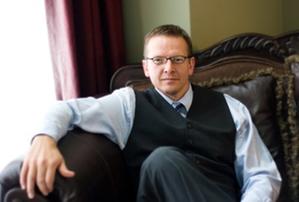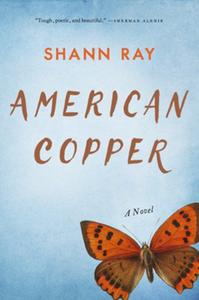
|
|
| photo: Vanessa Kay | |
Shann Ray grew up in Montana, played college basketball at Montana State University and Pepperdine University and professional basketball in Germany. His work has appeared in Poetry, McSweeney's, Narrative and Montana Quarterly, and has been selected for the Best New Poets and The Better of McSweeney's anthologies. He is the author of Balefire, a poetry collection, and American Masculine, a collection of stories. He lives with his wife and three daughters in Spokane, Wash., where he teaches leadership and forgiveness studies at Gonzaga University. American Copper (Unbridled Books, November 3, 2015) is his debut novel.
On your nightstand now:
Since my nightstand is so small, let's consider my desk my nightstand for a minute. Here, so many lovely, deeply felt, gorgeous books reside in not so neat stacks! C.D. Wright's Deepstep Come Shining; Claudia Rankine's Citizen; Jericho Brown's The New Testament; Michael Ondaatje's Coming Through Slaughter, The Collected Works of Billy the Kid and The English Patient; Sherman Alexie's War Dances; Carolyn Forché's anthologies Against Forgetting and Poetry of Witness. These and many more have been like good brothers and sisters while I was writing American Copper. In the novel, a copper baron's daughter named Evelynne Lowry, a Cheyenne cowboy and team roper named William Black Kettle, and a steer wrestler/bar room brawler named Zion address the darkness that often overwhelms them--the heartlessness of colonialism, the rage of racial injustice, the isolation of wealth and privilege--and in the end, they give something ultimate in order to reach toward forgiveness and atonement.
Favorite book when you were a child:
In Montana, I spent part of my childhood on the Cheyenne reservation. My family lived in trailers and mobile homes where the talk and the action was mostly about basketball and almost everything occurred in threes--as in 3-point jump shots. There were also dunks, quick moves, ball-handling skills, swishes and all around string music. Books were respected but not adored until later. My favorite book as a boy was Curious George, but mostly my family loved the wilderness and spent a lot of time in the mountains of Montana. When I started dating a girl named Jennifer, I was 17, and books became heart and soul. She introduced me to The Secret Garden, Candide, A Tale of Two Cities, Great Expectations, The Four Loves, Anna Karenina, War and Peace, Crime and Punishment, Les Misérables. Five years later, I married Jenn and the reading never stopped!
Your top five authors:
Here they are, but the top five are pretty much interchangeable with the top 500, from a passion and torque perspective:
- James Welch, especially Fools Crow and Winter in the Blood
- Leslie Marmon Silko, especially Ceremony
- bell hooks, especially All About Love and Feminist Theory: From Margin to Center
- Milan Kundera, especially The Unbearable Lightness of Being
- John Berger, especially To the Wedding
- Debra Magpie Earling, 7. Toni Morrison, 8. C.D. Wright, 9. Christian Wiman, 10. Graham Greene, 11. Emily Dickinson, 12. Willa Cather, 13. Czesław Miłosz, 14. Li-Young Lee, 15. Shūsaku Endō... (can I list the top 500 here?)
Book you've faked reading:
Lots of books assigned in high school and college. Sadly. The Catcher in the Rye comes to mind with a sting.
 Book you're an evangelist for:
Book you're an evangelist for:
Recently, I've loved the intricate, nation-bending work of these three: Toni Morrison's Home, Marilynne Robinson's Gilead and Graham Greene's The Power and the Glory. I was too scared to send love letters to Toni Morrison and Marilynne Robinson, or hold a séance to thank Graham Greene. Then I fell even more for C.D. Wright's Deepstep Come Shining, and I did muster the courage to write her. To my great surprise, she wrote back. She's as graceful and generous as her poems suggest.
Book you've bought for the cover:
All the Light We Cannot See by Anthony Doerr. Stunning. Absorbing. The cover takes you down into the book as if you've surrendered yourself to the ocean, the city, the light. And the book is an irreplaceable gem, among the very best novels I've read in the last 10 years.
Books you hid from your parents:
The Stranger by Albert Camus. "Create dangerously!" Gadamer's Truth and Method, who can fathom the depths of it? And I and Thou by Martin Buber, for the way it transcends dogma.
Books that changed your life:
All of the above, but I want to specifically say Fools Crow by James Welch for its evocation of the Blackfeet culture at the height of its power, which was every bit as dignified in grandeur and collective fierceness as the Roman empire. Also N. Scott Momaday's House Made of Dawn, for the poetic beauty and confrontation of American colonialism found in the title and in the prose. Finally, Milan Kundera's The Unbearable Lightness of Being, because we share Czech heritage, and for how he found an elegant and perhaps inescapable way to reach into Czech and Eastern Bloc Communist hyperbole and come out with greater notions of individual and collective responsibility for past atrocities.
Favorite line from a book:
"It was a pleasure to burn." --the opening line of Ray Bradbury's Fahrenheit 451.
Five books you'll never part with:
Emily Dickinson's collected poems: "Take all away from me but leave me ecstasy.... Not knowing when the dawn will come I open every door.... I am afraid to own a body/ I am afraid to own a soul."
Gerard Manley Hopkin's collected poems: "It will flame out like shining from shook foil/ it gathers to a greatness like the ooze of oil."
Shakespeare's collected poems: "Let me not to the marriage of true minds/ admit impediments. Love is not love/ which alters when it alteration finds."
The Book of Isaiah, to me the most heartrending of sacred scriptures: "beauty for ashes... and the garment of praise instead of the spirit of despair."
Tolstoy's War and Peace: "Nothing is so necessary for a young man as the company of intelligent women."
Book you most want to read again for the first time:
The Letters of Vincent Van Gogh. In those letters, Vincent says, "The greatest work of art is to love someone." The letters show a heart so full of love and so rich with desire for art, beauty and life. He was always poor as far as money in the pocket, but in the heart he was among the richest of all people.
Novels you love that read like poetry:
Poetry is my first love for the silence between the words, and the call to something higher. Great novels that read like poetry to me include: Housekeeping by Marilynne Robinson, The Bluest Eye by Toni Morrison, Ceremony by Leslie Marmon Silko, All the Light We Cannot See by Tony Doerr, Fools Crow by James Welch, To the Wedding by John Berger and Wise Blood by Flannery O'Connor.

